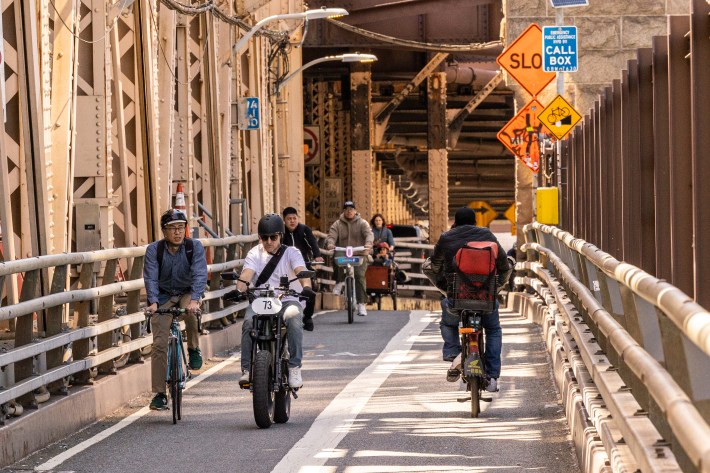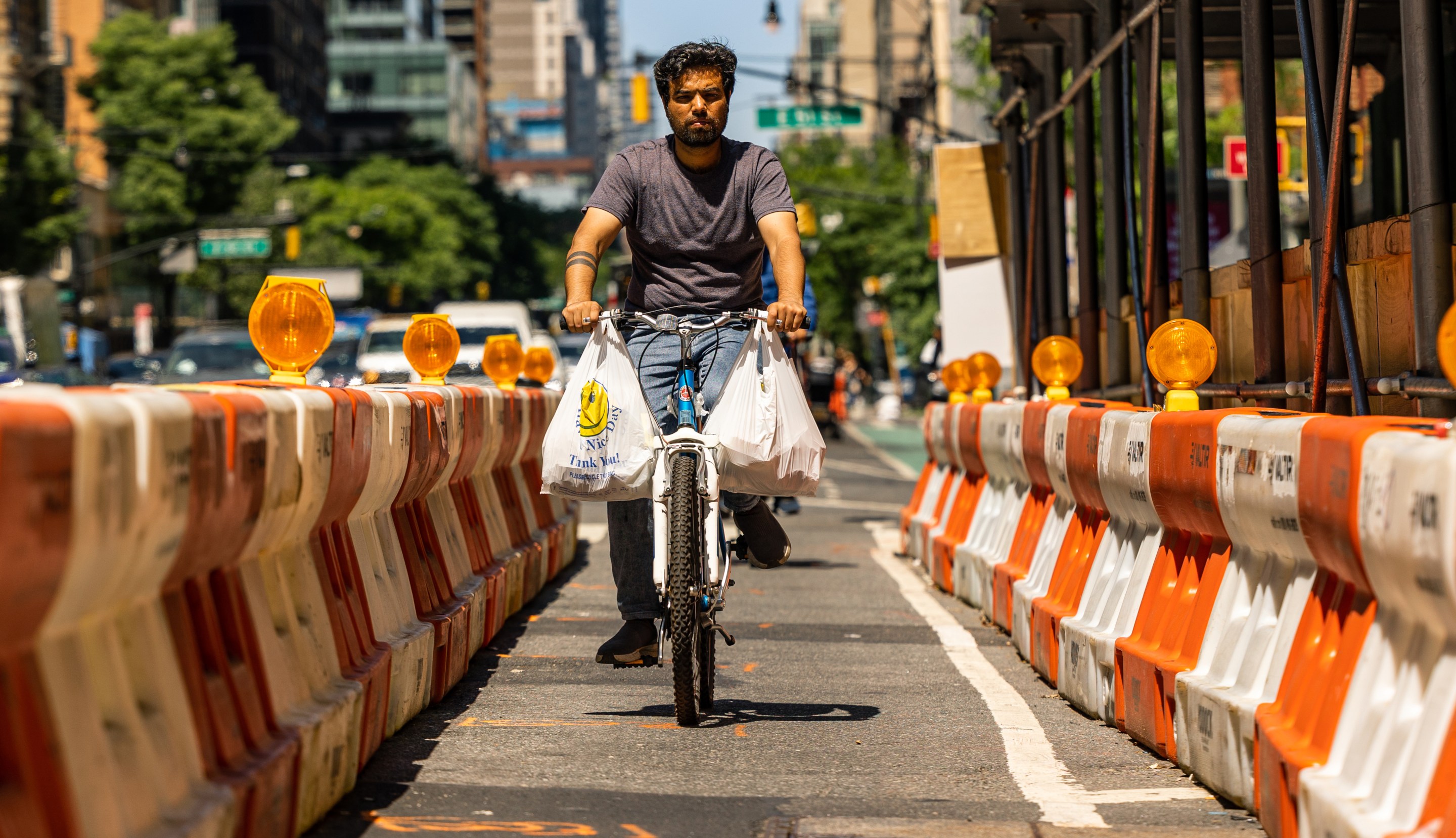Deliver us from chaos!
The city should make the "destructive" delivery apps pay for the right to operate in the five boroughs, a safe streets advocacy group recommended on Thursday, one of several ideas put forward to gird the Adams's administration's apparent creation of a new Department of Sustainable Delivery.
"The goal is to think holistically about an interconnected set of delivery challenges," said Danny Harris, executive director of Transportation Alternatives. "There are knee-jerk responses that don't work and then there are responses that look system-wide, and we're hopeful that this could potentially lead to a different way of combining people and assets and ideas to address the chaos on the streets."
And, Harris added, "the challenges of deliveries may be on e-bikes now, but they may be on drones or robots or who knows what's to come?"
That said, the group's recommendations are squarely focused on the current chaos — and on thwarting the popular "knee-jerk" reaction of heavily regulating electric bikes and destroying their ability to reduce car trips in an epically congested city.
The recommendations put the delivery app companies front and center — most radically, recommending that GrubHub, DoorDash, Uber Eats and the like would have to pay the city to operate.
The delivery companies would likely fight such proposal, given that companies such as FedEx, UPS and DHL operate — and, indeed, congest and endanger the roadways to a far greater extent than food delivery companies — without paying a dime right now.
Harris said the group's idea was motivated by the Department of Sanitation’s Waste Carting Zones, which were created after unregulated private carting practices led to crashes and worker deaths.
"Same-day delivery apps would be regulated by New York City and then charged for the privilege of operating in the five boroughs," he said. "And they would also be required to meet mandatory minimum standards to operate," rather than placing on individual workers the burden of making streets safer.

The companies would pay for licenses, much as sightseeing companies or newsstand owners are, and that money would be funneled into infrastructure upgrades, safe batteries, bike parking and other safety upgrades, Harris said.
The industry would also have to:
- Offer delivery workers paid time to seek medical care or to file a police report after an on-the-job injury or theft.
- Provide delivery workers with speed-limited e-bikes with approved UL batteries and other safety features. (That requirement is the subject of pending legislation in the Council that is vehemently opposed by the delivery industry.)
- Share anonymized data, such as routes, speed, wages, and hours worked by employees so that the city can use that data to make informed choices about where to allocate its street improvement project budget.
The proposed sustainable delivery agency itself should be empowered to:
- Create safe public charging infrastructure and/or battery swapping at delivery hubs.
- Provide secure on-street bike parking at high pick-up and delivery locations.
- Prevent the sale of mopeds to unlicensed drivers.
And the mayor and City Council should pass laws that:
- Phase out all gas-powered vehicles, including cars and mopeds, for delivery, and require companies to provide non gas-powered mobility devices to workers.
- Ban the practice of “immediate” delivery, including any service which promises delivery within 20 minutes or less.
- Require the city to prioritize protected bike lanes based on delivery data, cyclist injury rates, and “biking on the sidewalk” summonses.
Given that residents of the wealthiest neighborhoods order the most food for delivery, that last recommendation sounded as if Transportation Alternatives was advocating for more safety infrastructure in the richest areas. But Harris disagreed.
"The goal here isn't that this would be the only metric, but additional data that could be used like Citi Bike trip data — as data points that help the city understand the conditions and the usage patterns," he said. "Look at where the delivery workers live. They cross the Queensboro Bridge and the bridges from the Bronx as they're commuting to work. Those areas need infrastructure and safety improvements."
City Hall said it is "in discussions with the City Council" to create an agency that will "regulate new forms of delivery transit while protecting workers and consumers and keeping all road users safe."
On Friday, after initial publication of this story, spokesman Charles Lutvak said the mayor and his team "appreciate feedback from across the city and will review the recommendations.”
A spokesman for Uber was quite dismissive.
"The Council has passed 10-plus bills regulating third-party delivery apps over the past three years," said Josh Gold of Uber. "Meanwhile grocery services remain completely unregulated and the 40 percent of city restaurants that use their own delivery staff still take advantage of a tip credit."
And a spokesman for DoorDash suggested that app giants have done their share already.
"The city’s minimum pay rate for food delivery workers specifically includes $2.26 per hour to compensate workers for personal costs associated with performing deliveries, the majority of which was calculated to pay for certified e-bikes, quality batteries, and safety equipment," said Eli Scheinholtz, adding that Transportation Alternatives' recommendations "do not address how dangerous batteries can be recycled or disposed of."
It's unclear if the money for equipment is nearly enough; since the city began regulating lithium-ion batteries, their costs have risen dramatically, as Streetsblog reported.
Harris pushed back on the industry pushback.
"The industry has created a race to the bottom which has made delivery worker the most dangerous profession in the city," he said. "And there's no real accountability for the apps. They promise to deliver your Thai food in under 30 minutes and, to them, it doesn't matter what's required. Well, it's having very, very serious consequences all across the city, not only for the workers, but for people who are being put in reckless conditions just trying to walk around the street."






